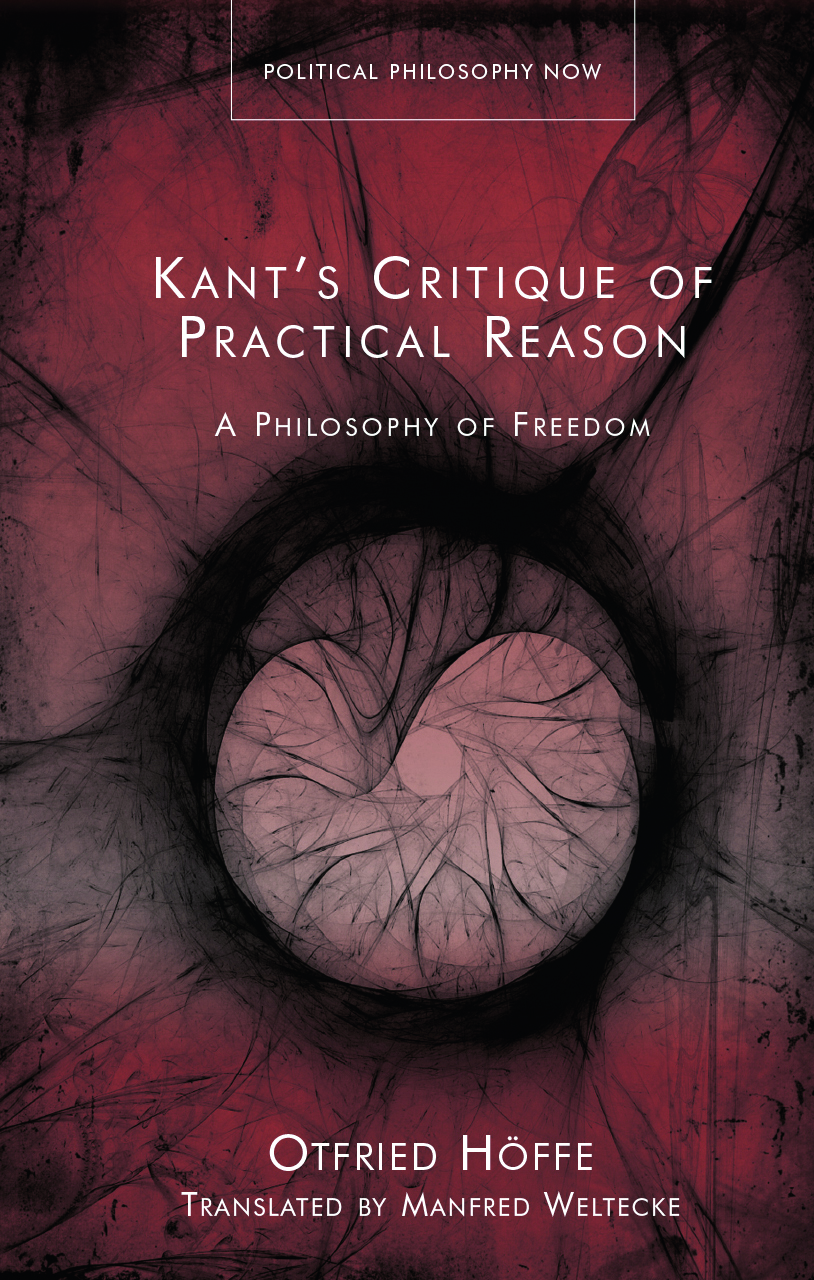Kant’s Critique of Practical Reason
A Philosophy of Freedom
Author(s) Otfried Höffe
Language: English
Genre(s): Philosophy
Series: Political Philosophy Now
- September 2023 · 296 pages ·216x138mm
- · Hardback - 9781837720453
- · eBook - pdf - 9781837720460
- · eBook - epub - 9781837720477
Published in English for the first time, Kant’s Critique of Practical Reason is a slightly abridged and updated edition of Professor Höffe’s groundbreaking work originally published in German. In the book, the author systematically introduces one of the most important areas of Kant's philosophy, and relates its basic ideas to the debates of today.
The first part introduces the four driving forces that motivated Kant’s practical philosophy and which are still relevant today: Enlightenment, critique, morality and cosmopolitanism. The second part demonstrates the extent to which Kant revolutionised moral philosophy. In the third part, the author explains the provocations that lie at the heart of Kant’s practical philosophy. The remaining parts deal with political philosophy, the philosophy of history, and Kant’s thinking about religion and education.
‘In this thorough study, Otfried Höffe, one of Europe's most cited philosophers, goes well beyond an account of the second Critique, He makes a convincing argument that all of Kant's critical philosophy is devoted to a sophisticated defense, with great contemporary relevance, of the primacy of practical reason in general.’
Karl Ameriks, McMahon-Hank Professor of Philosophy Emeritus, University of Notre Dame
‘Otfried Höffe’s book is a tour de force that is thought provoking and erudite in equal measure, ranging from well-known themes in Kant’s ethics and political philosophy to his theory of education and philosophy of religion. Compulsory reading for anyone interested in the lasting legacy of the European Enlightenment.’
Jens Timmermann, Professor of Moral Philosophy, The University of St Andrews
Preface
1. Introduction: Four Motivating Forces
1.1 Enlightenment – 1.2 Critique in the Style of a Judicial Trial– 1.3 Morality – 1.4 Cosmopolitanism
Part 1: Kant’s Revolution of Moral Philosophy
2. Ethics as Practical Philosophy
2.1 Primacy of the second Critique – 2.2 Moral Interest – 2.3 Pure Practical Reason – 2.4 A Proof in Seven Steps – 2.5 The Decisive Passage
3. Critique of the Principle of Happiness
3.1 Moralizing in an Ivory Tower? – 3.2 Mere Form – 3.3 Two Ethical Theories of Happiness: Aristotle and Utilitarianism
4. The New Formula: The Categorical Imperative
4.1 Three Tasks – 4.2 The Law of Nature as a Character of Law – 4.3 The Example of the Deposit – 4.4 An Ethics of Maxims
5. The Freedom of the Will and the Fact of Reason
5.1 Looking Back at the Third Antinomy – 5.2 Free Will – 5.3 The Moral Law Prior to Freedom – 5.4 The Fact of Reason – 5.5 Why be Moral: the Feeling of Respect – 5.6 What can Modern Moral Philosophy Learn from Kant?
Part 2: Kant’s Provocations
6. Provocation 1: A Highest Good?
6.1 A Parallel to the First Critique? – 6.2 From Duty to Hope: the Highest Good – 6.3 Re-Theologizing and a Rest of Eudaimonism? – 6.4 General (Quasi-)Dialectic of Pure Reason – 6.5 The Postulates: God and Immortality
7. Provocation 2: Duty contra Desire? (Schiller)
7.1 Does Morality Require the Contrast with Desire? – 7.2 What is it That Finds Unity in the Beautiful Soul? – 7.3 Kant or Schiller?
8. Provocation 3: A ‘Metaphysics’ of Morals?
8.1 Kant as an Aristotelian – 8.2 Aristotle’s Ethics: Free of Metaphysics, yet Metaphysical – 8.3 Kant’s Ethics: Metaphysical, yet Free of Metaphysics
Part 3: World Politics and World History
9. Kant’s Justice Theory of Peace
9.1 A Plethora of Innovations – 9.2 ‘Royal Peoples’ and a Royal Humanity – 9.3 A Realistic Vision
10. A Cosmopolitan Philosophy of History
10.1 The Framework of Discussion – 10.2 The Texts – 10.3 Against Cyclopic Learnedness – 10.4 The Engine: Antagonism – 10.5 Thinking of Progress: Modest-Immodest – 10.6 On the Epistemic Status
11. On the Guarantee of Perpetual Peace
11.1 A Quasi-Transcendental Deduction – 11.2 The Solution: „Nature the Great Artist’ – 11.3 Outer and Inner Nature – 11.4 Constitutional, International and Cosmopolitan Right – 11.5 Epistemic Status
Part 4: Religion, Education und the Final End
12. The Rational Limits of Religion
12.1 No Fourth Critique – 12.2 The New Project – 12.3 ‘Bare’ Reason – 12.4 Thematic and Methodical Innovations – 12.5 The Main Topics – 12.6 A Wealth of Interpretations – 12.7 Interim Result
13. Philosophy of Education
13.1. Pedagogical Anthropology – 13.2 Four Goals of Education – 13.3. ‘The Child is supposed to ... Learn to Work’ – 13.4 Result
14. Human Beings as the Final End
14.1 The Provocative Claim – 14.2 Kant’s Argument – 14.3 On the Final End
15. A Look at the More Recent German Debate
15.1 The Textual Basis – 15.2. A Kant Lexicon – 15.3 Commentaries – 15.4 Monographs
Afterword
Abbreviations and Method of Citation
Bibliography
Index of Names
Index of Subjects


